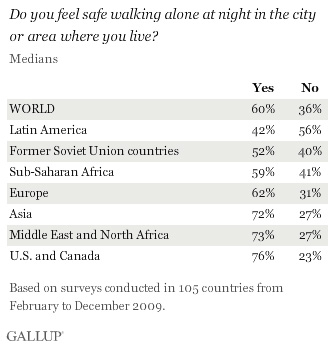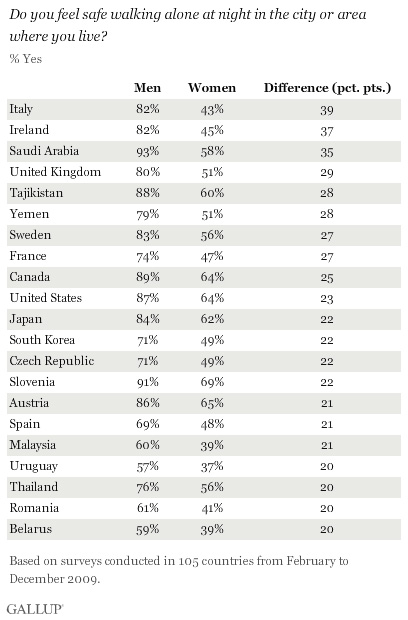
|  |  |  Editorials | Issues Editorials | Issues  
Latin Americans Least Likely to Feel Safe Walking Alone at Night
 Cynthia English & Julie Ray - Gallup Cynthia English & Julie Ray - Gallup
go to original
November 01, 2010

Washington, D.C. - Worldwide, residents of Latin America are the least likely to personally feel safe in their communities. Across 18 Latin American countries surveyed in 2009, a median of 42% of residents say they feel safe walking alone at night where they live.



Less than half of adults in all 18 Latin American countries say they feel safe, but their sense of security varies and is lowest in Venezuela, at 23%. Venezuelans are among the least likely in the world to say they feel safe, which likely reflects the worsening crime situation in the last decade.

Along with Venezuelans, South Africans are among the least likely in the world to say they feel safe. How secure residents across the sub-Saharan Africa region feel differs dramatically, however -- ranging from a high of 84% in Djibouti to a low of 20% in South Africa. South Africa is known for its high incidence of violent crime, including one of the highest murder rates in the world.

Residents in Asia and the Middle East and North Africa region are the most likely to say they feel safe walking alone at night in their communities. Singaporeans almost universally feel safe, at 98% -- the highest level of security of any country or area surveyed. However, less than half of adults in several countries and areas in conflict in these two regions say they feel safe: Iraq (34%), Afghanistan (37%), Pakistan (42%), Nepal (43%), and the Palestinian Territories (47%).

Women Feel Less Safe Than Men

In 93 of the 105 countries and areas surveyed, women are significantly less likely than men to say they feel safe walking alone at night in the city or area where they live. While this is not that surprising, the striking differences between men and women in some developed countries are. There is at least a 20-percentage-point difference between men and women in 21 countries, including Canada, France, Japan, the United Kingdom, and the United States.



Bottom Line

While many factors contribute to feelings of personal insecurity or security, a median of 36% adults worldwide are afraid to walk alone at night in their communities, with women in nearly every country surveyed significantly more fearful than men. Gallup's data show fear hinders people's freedom in many countries and the huge disparities within regions show this is an issue that likely needs to be addressed at the local level.

For a complete list of findings, see below.

• • •

Visit Real Clear World's Top 5s feature to learn more about the countries where residents are most likely to feel personally safe.

For complete data sets or custom research from the more than 150 countries Gallup continually surveys, please contact SocialandEconomicAnalysis(at)gallup.com.

Survey Methods:

Results are based on telephone/face-to-face interviews with approximately 1,000 adults in 102 countries, 2,000 adults in Russia, 3,000 adults in India, and 4,200 in China, aged 15 and older, conducted in 2009. For results based on the total sample of national adults, one can say with 95% confidence that the maximum margin of sampling error ranged from a low of ±2.1 percentage points in China to a high of ±5.7 percentage points in Slovenia. The margin of error reflects the influence of data weighting. In addition to sampling error, question wording and practical difficulties in conducting surveys can introduce error or bias into the findings of public opinion polls.



 |

 |
|  |



